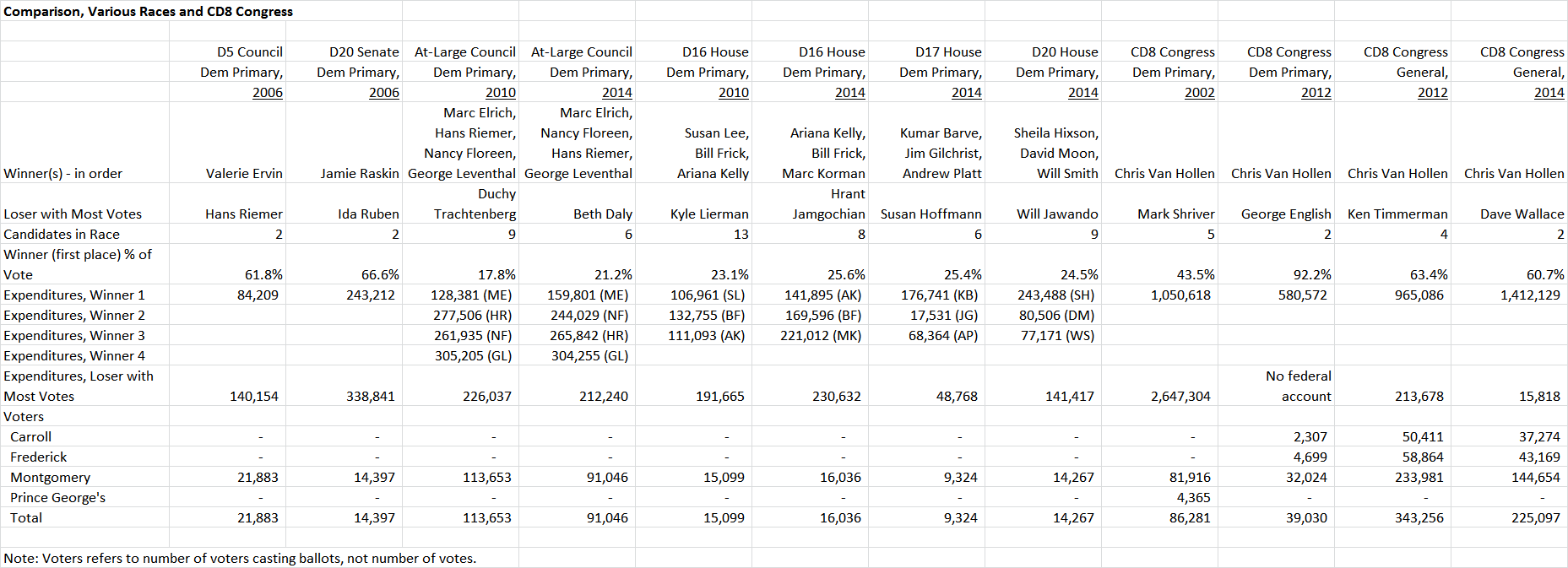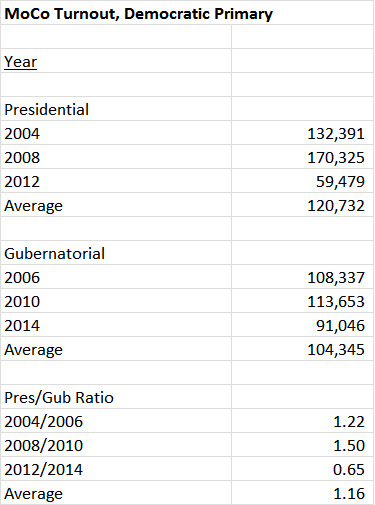Today, I am pleased to present a guest post from Adam Pagnucco:
Long-time District 8 Congressman Chris Van Hollen is now running for the U.S. Senate. Who will succeed him? No one knows because this race is wide open. That’s right, wide open.
Announced or potential candidates include At-Large Councilmembers Nancy Floreen and Hans Riemer, District 20 State Senator Jamie Raskin, District 17 Delegate Kumar Barve, District 16 Delegate Ariana Kelly, former District 5 County Council Member Valerie Ervin, former District 20 Delegate candidate Will Jawando and former WJLA anchor and current Marriott executive Kathleen Matthews. All except Matthews have campaign records. None have run campaigns that approach anything close to the scale of a congressional race.
Consider the following data.

Campaign Spending
In the CD8 2002 primary, Chris Van Hollen spent $1.1 million and won. Mark Shriver spent $2.6 million and lost. None of the prospective candidates in the current CD8 have demonstrated that kind of monetary capacity. Raskin, Riemer and Floreen spent between 200k and 300k on their competitive races. Barve came close to that level in 2014. Ervin has never spent more than 100k in a campaign. All of these candidates would need to dramatically increase their fundraising activity and it’s hard to see that any one has a significant advantage over the others. Matthews, who may be able to draw on self-financing, national Dem money and corporate money, may be an exception.
Size of Electorate
It’s tricky to forecast the size of the CD8 Dem primary electorate because the district was changed radically in 2012 and it does not have a recent experience of primary competition. Van Hollen faced no-names in both the 2012 and 2014 primary and general elections. In the 2002 primary, when the district was almost entirely in MoCo, 86,000 Dems voted. That was a high turnout year for Dems in terms of gubernatorial elections, but 2016 is a presidential year and many more Dems could turn out. In 2012, a presidential year, just 39,000 Dems voted in the primary, as Van Hollen clobbered an opponent without a federal account and there was no meaningful competition in the Presidential and U.S. Senate races. A combination of competition in the U.S. Senate and CD8 races, plus support for Hillary Clinton, could drive turnout in the 2016 CD8 Dem primary north of 100,000.
Among the possible candidates in the CD8 primary, only Nancy Floreen and Hans Riemer have experience running in an electorate that large. State legislative races tend to draw out 7,000-16,000 Democratic primary voters. But Floreen and Riemer don’t necessarily have an advantage because their races are fundamentally different from congressional contests (more below).
Multiple-Vote vs One-Vote Races
A congressional race has one similarity to a State Senate race: voters only get to vote for one candidate. In House of Delegates races (at least in MoCo), voters can vote for up to three candidates. In Council At-Large races, they can vote for up to four. These are very different dynamics.
In a multiple-vote race, a candidate can be no one’s first choice, but can be the second or third choice of a lot of people and still win. Such a candidate would do poorly in a one-vote race like Congress. Even though Floreen and Riemer have won countywide, many of their voters are not voting for them. In 2010, 113,653 MoCo Democrats voted in the primary. Riemer received 40,493 votes (36%) and Floreen received 39,500 (35%). In 2014, 91,046 MoCo Democrats voted in the primary, which was notably less competitive than it was in 2010. Riemer received 49,932 votes (55%) and Floreen received 52,924 votes (58%). The number of voters who would rate either Riemer or Floreen as their first choice would be FAR fewer and would be closer to the total of one of the State Senators.
For what it’s worth, Floreen finished first in 32 of the 138 CD8 precincts located in Montgomery County in 2014. Riemer finished first in 11. At-Large Council Member Marc Elrich, who finished first in 90 CD8 precincts, has shown no interest in a Congressional race.
Delegates have similar problems. Barve and Kelly finished first in their respective House races, but the number of their voters who would have picked them as a first choice is unknowable short of a contemporaneous poll.
District Overlap
State legislators do not enter this race on equal footing. District boundaries and voting patterns give some an advantage over others. Delegate Ariana Kelly benefits from the fact that her district has more actual primary voters in CD8 than any other MoCo state legislative district. In terms of cards cast on 2014 primary election day by residents of CD8, Kelly’s District 16 led with 14,114, followed by District 18 (12, 072), District 20, home of Senator Jamie Raskin and Will Jawando (9,331), District 19 (6,948), District 17, home of Delegate Kumar Barve (4,929), District 14 (3,302) and District 15 (442). Barve is handicapped by the fact that 42% of voters in his district reside in CD6, not CD8.
Women
Fifty-nine percent of MoCo Democrats are women. That figure applies to registered Dems, voting Dems and “super-Dems,” or Dems who always vote. This is not necessarily a prohibitive advantage for female candidates. But if one or two strong women face off against a male-dominated field, it’s possible that this factor could act as something like a tiebreaker. A savvy female candidate might point out that with U.S. Senator Barbara Mikulski’s retirement and Rep. Donna Edwards’ entry into the Senate race, the state could be facing the very real prospect of an all-male congressional delegation.
Presidential Year vs. Gubernatorial Year Turnout
Presidential year Democratic primaries tend to attract higher turnout than gubernatorial year Dem primaries. Below are stats on how many MoCo Dems voted in the primary over the last six elections (both presidential and gubernatorial). With the glaring exception of 2012, when there was little or no competition in the presidential, U.S. Senate and CD8 races, presidential year turnouts tend to be higher. That means in a presidential year CD8 race, there will be tens of thousands of Democratic voters who have not voted in gubernatorial races and do not know their state senators, delegates or councilmembers. Communicating with these people will be a significant challenge for any candidate. Also, anywhere from a sixth to a fifth of the CD8 primary electorate will be residents of Carroll and Frederick Counties.

Bottom Line
There are no favorites in this field. No candidate has proven that he or she can raise the money for a congressional campaign. The at-large County Council candidates run across a big geography but not in one-vote races. State legislators have small districts (at least compared to CD8) and delegates run in multiple-vote elections. Tens of thousands of non-gubernatorial and non-MoCo voters will have no idea who any of the candidates are and they will need some attention.
Wide open, folks. This contest is wide open.




